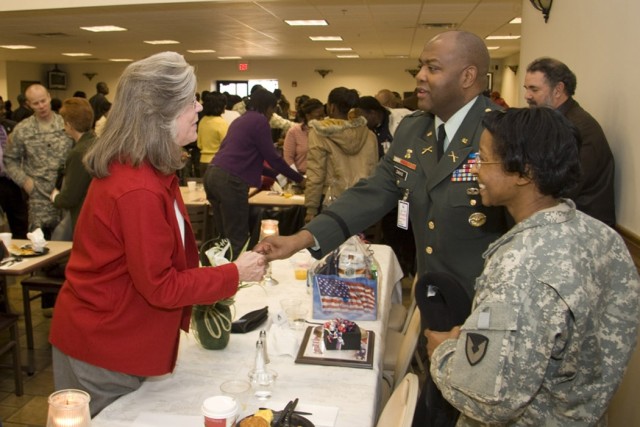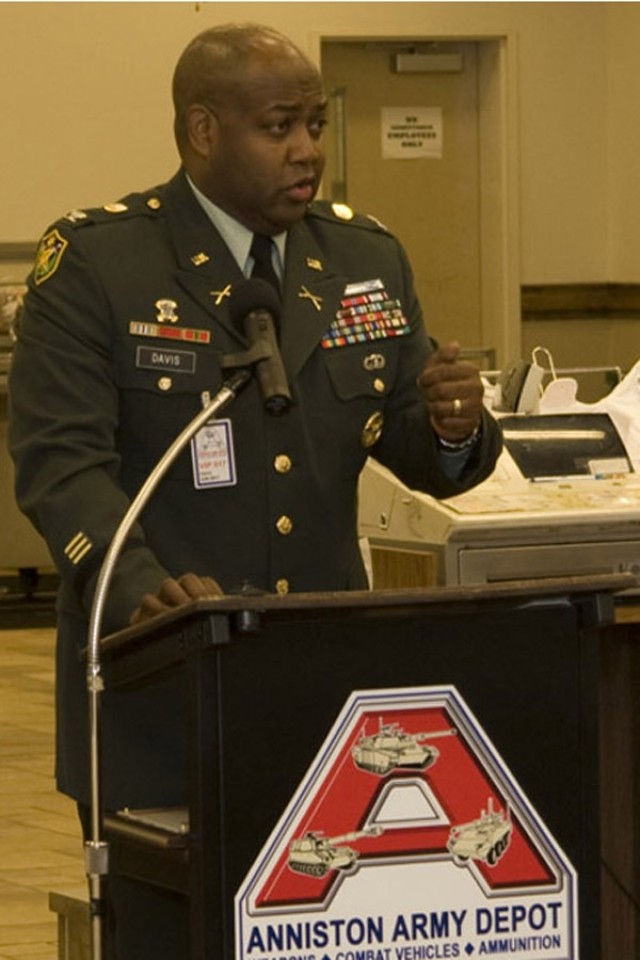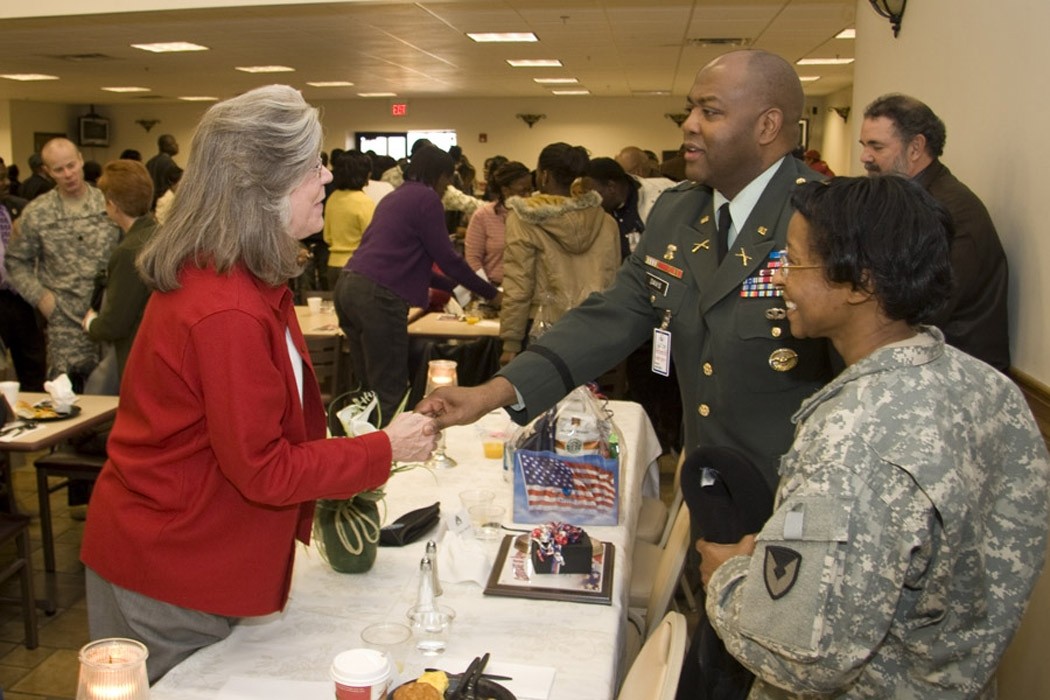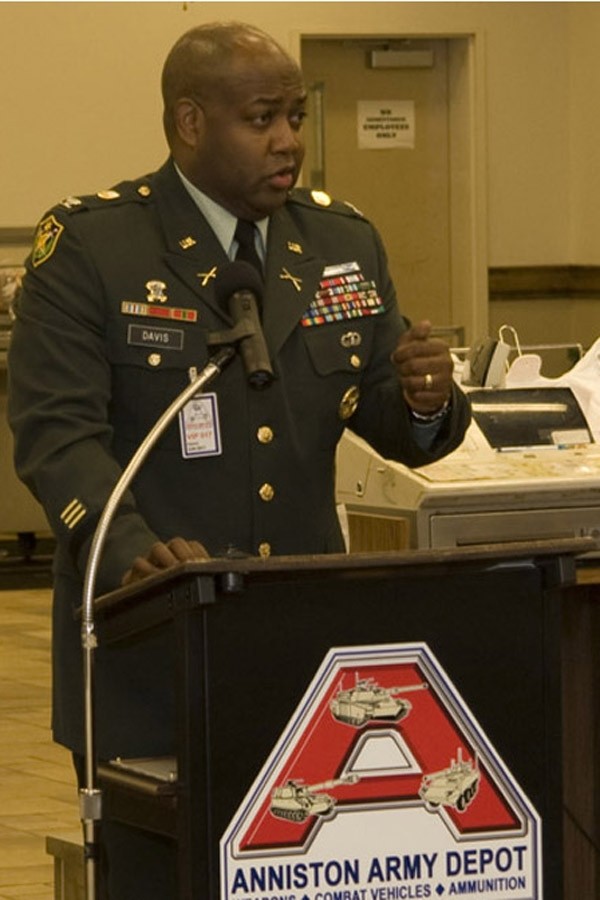Depot celebrates a leader for all people--Martin Luther King Jr.
by Clester Burdell, ANAD PAO
On the 79th birthday of the late civil rights leader, Anniston Army Depot's Equal Employment Opportunity Office hosted a breakfast in memory of his fight for freedom, equality, and dignity of all races and people.
Dr. Martin Luther King Jr. was known for drawing large crowds, much like the audience that gathered-despite the frigid temperatures-on Jan. 15 at the depot's CafAfA East to hear Col. Archie Davis reflect on the life of the humanitarian.
Davis, director of the Army Materiel Command's Public and Congressional Affairs, began by setting the scene of his view of King's conversation with the almighty as he prophetically delivered in his I See the Promised Land message on April 3, 1968, the day before he was assassinated.
A glimpse into the future
Davis brilliantly recited excerpts from that speech. "As you know, if I were standing at the beginning of time, with the possibility of general and panoramic view of the whole human history up to now, and the Almighty said to me, 'Martin Luther King, which age would you like to live in''--I would take my mental flight by Egypt through, or rather across, the Red Sea, through the wilderness on toward the Promised Land.
And in spite of its magnificence, I wouldn't stop there. I would move on by Greece, and take my mind to Mount Olympus. And I would see Plato, Aristotle, Socrates, Euripides and Aristophanes assembled around the Parthenon as they discussed the great and eternal issues of reality.
But I wouldn't stop there. I would go on, even to the great heyday of the Roman Empire. And I would see developments around there, through various emperors and leaders.
But I wouldn't stop there. I would even come up to the day of the Renaissance, and get a quick picture of all that the Renaissance did for the cultural and esthetic life of man. But I wouldn't stop there. I would even go by the way that the man for whom I'm named had his habitat. And I would watch Martin Luther as he tacked his ninety-five theses on the door at the church in Wittenberg.
But I wouldn't stop there. I would come on up even to 1863, and watch a vacillating president by the name of Abraham Lincoln finally come to the conclusion that he had to sign the Emancipation Proclamation.
But I wouldn't stop there. I would even come up the early thirties, and see a man grappling with the problems of the bankruptcy of his nation. And come with an eloquent cry that we have nothing to fear but fear itself.
But I wouldn't stop there. Strangely enough, I would turn to the Almighty, and say, 'If you allow me to live just a few years in the second half of the twentieth century, I will be happy.'"
As history has it, Davis continued, King lived 18 years into the 20th Century. Part of his dream, "that one day this nation would rise up and live out the true meaning of its creed" were quotes from parts of the Constitution and the Declaration of Independence. King was arousing the conscience of the nation to do what it said it would do. Many people viewed King as a crusader and leader for Black people, but he was a leader for all people, a leader for humanity.
Today he would say
Fast forwarding to 2008, Davis asked the question - "If he was alive today, what would he say'"
"I think he'd say, Anniston Army Depot, well done," Davis replied. "He'd look out and see blacks and whites sitting around the table. You're only limited by the size of your ideas and the degree of your dedication. And the justice not be abused or discriminated against. Injustice anywhere is a threat to justice everywhere. He'd say that we're doing well but we must keep our eye on the prize and not become complacent."
What will people remember about him'
Though King was a nonviolent civil rights leader, author, minister, recipient of a Ph.D., leader of the March on Washington in 1963 with more than 250,000 protesters where he delivered his I Have A Dream speech, Time Magazine's Man of the Year, winner of the 1964 Nobel Peace Prize, and recipient of countless accolades and awards, he wanted to be recognized merely as a servant.
During one of his pastoral messages at Ebenezer Baptist Church, King once told his congregation that he didn't want people to talk about his titles, degrees or awards-for none of these things mattered. But what he did want someone to say about him was "that he tried to give his life serving others."
He didn't know that day would come before he reached his 40th birthday. In 1968, he was assassinated two months to the day after delivering that sermon.




Social Sharing